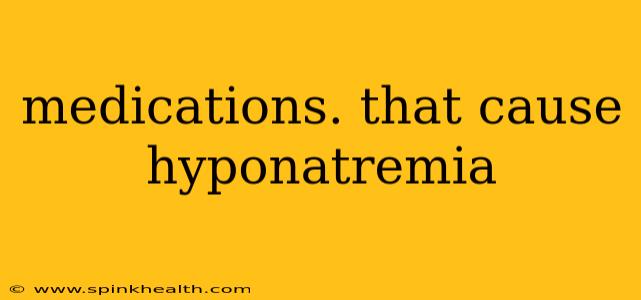Hyponatremia, a condition characterized by abnormally low levels of sodium in the blood, can have serious consequences. While dietary factors can contribute, certain medications are surprisingly common culprits. This comprehensive guide delves into the medications most frequently associated with hyponatremia, explaining the mechanisms involved and offering crucial insights for both patients and healthcare professionals. This isn't intended as medical advice; always consult your doctor or pharmacist before making any changes to your medication regimen.
My name is Alex, and I've spent years researching the interplay between medication and electrolyte imbalances. I've witnessed firsthand the impact of hyponatremia, and I'm passionate about empowering individuals with the knowledge to protect their health.
What are the most common medications that cause hyponatremia?
Many medications can contribute to hyponatremia, but some are more frequently implicated than others. The list below isn't exhaustive, but it highlights some of the major offenders:
- Anticonvulsants: Certain anticonvulsant drugs, such as carbamazepine and oxcarbazepine, have been linked to hyponatremia. These medications can affect the kidneys' ability to regulate sodium levels, leading to a deficiency.
- Antidepressants: Some antidepressants, especially selective serotonin reuptake inhibitors (SSRIs) like fluoxetine (Prozac) and sertraline (Zoloft), and tricyclic antidepressants, can increase the risk of hyponatremia, often in conjunction with other factors such as dehydration or underlying medical conditions.
- Diuretics: Ironically, diuretics, which are often prescribed to reduce fluid retention, can contribute to hyponatremia if not carefully managed. Loop diuretics, such as furosemide (Lasix), and thiazide diuretics are particularly noteworthy. While they help remove excess water, they can also flush out sodium if not balanced correctly.
- Opioids: Certain opioids, particularly those used for long-term pain management, can increase the risk of hyponatremia. The mechanism often involves the interaction with the body's hormonal regulation of fluid balance.
- Nonsteroidal anti-inflammatory drugs (NSAIDs): While not as directly linked as other medications, long-term use of NSAIDs like ibuprofen and naproxen can sometimes contribute to hyponatremia through their effects on kidney function and fluid balance.
How do these medications cause hyponatremia?
The mechanisms by which these medications cause hyponatremia are complex and vary depending on the specific drug. However, some common themes emerge:
- Increased water retention: Some medications can lead to the body holding onto more water than usual, diluting the sodium concentration in the blood.
- Decreased sodium excretion: Other medications can interfere with the kidneys' ability to properly excrete sodium, resulting in a buildup of water relative to sodium.
- Hormonal effects: Certain medications can disrupt the hormonal balance that regulates sodium and water levels in the body. This can lead to inappropriate secretion of antidiuretic hormone (ADH), causing increased water retention.
What are the symptoms of hyponatremia?
The symptoms of hyponatremia can vary widely depending on the severity and speed of onset. Mild hyponatremia may produce few noticeable symptoms, while severe hyponatremia can lead to:
- Nausea and vomiting
- Headache
- Confusion and disorientation
- Muscle weakness
- Seizures
- Coma
How is hyponatremia treated?
Treatment for hyponatremia focuses on restoring the body's sodium balance. The specific treatment approach will depend on the severity of the condition and the underlying cause. It often involves careful fluid management and, in some cases, intravenous sodium administration. In situations where medications are contributing to the hyponatremia, adjustments to the medication regimen may be necessary.
Can you get hyponatremia from over-the-counter medications?
While less common than with prescription medications, some over-the-counter (OTC) medications can theoretically contribute to hyponatremia, particularly if taken in large doses or for prolonged periods. This is especially true for some OTC pain relievers and diuretics. Always follow the recommended dosage instructions and consult a doctor or pharmacist if you have any concerns.
What are some risk factors for medication-induced hyponatremia?
Several factors can increase the risk of developing hyponatremia while taking medications:
- Age: Older adults are generally more susceptible to medication-induced electrolyte imbalances, including hyponatremia.
- Underlying medical conditions: Conditions that affect kidney function or hormone regulation can increase the risk.
- Polypharmacy: Taking multiple medications simultaneously increases the likelihood of drug interactions and side effects, including hyponatremia.
- Dehydration: Dehydration can exacerbate the effects of medications that can contribute to hyponatremia.
Conclusion:
Hyponatremia is a serious condition that can be triggered or exacerbated by various medications. Understanding the medications most frequently associated with hyponatremia, their mechanisms of action, and the associated risk factors is vital for both patients and healthcare professionals. Always prioritize open communication with your healthcare provider about your medications and any symptoms you experience. Early detection and appropriate management can prevent serious complications. Remember, this information is for educational purposes only and does not substitute professional medical advice.

